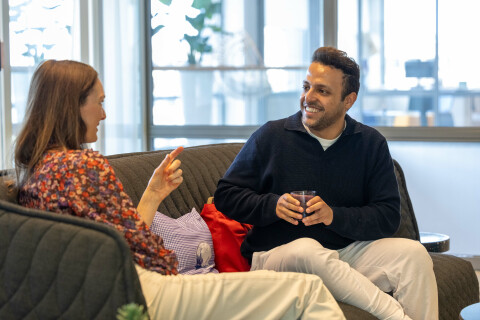
11 oktober 2024
Hoe behoud je talent?
- retentie
- cultuurverschillen
- werkgeverssessie
- diversiteit & inclusie
Bij Refugee Talent Hub richten we ons niet alleen op het matchen van talent met werkgevers, maar ook op het behoud van dat talent. Tijdens de werkgeverssessie van 2 oktober 2024 werd dit onderwerp uitgebreid besproken door collega Jan-Simon Rotgans, senior partnershipmanager bij Refugee Talent Hub. Op basis van gesprekken met (oud-)kandidaten deelde hij zijn belangrijkste inzichten.
Waarom retentie nu cruciaal is
Jan-Simon benadrukt dat retentie een steeds belangrijker thema wordt, vooral gezien de huidige economische onzekerheid. Waar organisaties voorheen vooral gericht waren op het aantrekken van nieuw talent, ligt de focus nu meer op het behouden van hun bestaande medewerkers. Jan-Simon: "Bij Refugee Talent Hub merken we dat het eerste jaar van het dienstverband vaak een uitdaging is. Dit is een cruciale fase waarin veel bedrijven kansen laten liggen. Een sterk retentiebeleid zorgt voor continuïteit vanaf het begin, helpt bij de ontwikkeling van expertise binnen teams en draagt bij aan hogere productiviteit.” Aan de hand van een aantal thema’s deelt Jan-Simon vervolgens belangrijke punten om rekening mee te houden.
Communicatie en begrip zijn essentieel
Een van de uitdagingen die naar voren komt in gesprekken met (oud-)kandidaten, is dat verwachtingen rondom rollen en verantwoordelijkheden niet altijd duidelijk zijn voor mensen met een vluchtelingenachtergrond. Dit kan leiden tot misverstanden en soms zelfs tot frustratie. Jan-Simon benadrukt hoe belangrijk het is om vanaf het begin helder te communiceren: "Wat verwacht je van de kandidaat en wat kunnen zij van jou verwachten? Een open dialoog waarin empathie centraal staat, blijkt cruciaal. HR en/of hiring managers kunnen dit verbeteren door open te communiceren vanuit hun perspectief. Dit benadrukt hoe belangrijk het is om als werkgever niet alleen zakelijk te blijven, maar ook menselijk en begripvol te zijn."
Heldere verwachtingen op de werkvloer
Een ander belangrijk thema is de werkvloer zelf. Kandidaten richten zich vaak vooral op hun directe taken, zonder altijd oog te hebben voor bredere teamdoelen. Het procedureel denken is vaak een gevolg van cultuurverschillen en ook het asieltraject dat is afgelegd kan een rol spelen. "Er kan een kloof ontstaan tussen wat een werkgever verwacht en wat de kandidaat denkt dat zijn of haar taak is." Het is dus essentieel om niet alleen de functie zelf duidelijk te maken, maar ook goed te communiceren over de bredere context van de functie en wat succes binnen jouw organisatie betekent. Dit kan ook helpen om culturele verschillen te overbruggen, die vaak de oorzaak zijn van misverstanden op de werkvloer.
Carrièreplanning: zorg voor een veilige omgeving
Een interessant thema dat ter sprake kwam, was carrièreplanning. Veel vluchtelingen houden hun ambities voor zichzelf, merkt Jan-Simon op in gesprekken met (oud-)kandidaten. Ze zijn het niet gewend om dit met hun werkgever te bespreken. Het bespreekbaar maken van hun loopbaanontwikkeling kan echter helpen om hun groei te ondersteunen. Jan-Simon geeft aan dat dit niet alleen belangrijk is voor hun persoonlijke ontwikkeling, maar ook voor de werkgever, die zo beter kan inspelen op hun behoeften. Daarnaast denken veel kandidaten vooral in termen van verticale groei (promotie), terwijl er in Nederland ook steeds meer waarde wordt gehecht aan horizontale groei, zoals het wisselen van functie binnen de organisatie.
Samengevat
De volgende vijf punten vatten de belangrijkste lessen samen:
- Wees empathisch en luister actief – Het tonen van begrip voor de achtergrond van vluchtelingen is cruciaal in het opbouwen van een sterke werkrelatie.
- Communiceer helder over verantwoordelijkheden – Zorg dat kandidaten niet alleen hun taken kennen, maar ook het bredere plaatje binnen de organisatie begrijpen.
- Maak carrièreplanning bespreekbaar – Door ambities en persoonlijke doelen te bespreken, kun je werknemers beter ondersteunen in hun ontwikkeling.
- Stel vragen over de ervaring van nieuwkomers op de werkvloer – Dit kan helpen om eventuele problemen vroegtijdig te signaleren en op te lossen.
- Zorg voor een veilige omgeving – waarin kandidaten open durven te zijn over hun ervaringen en ambities.
Wil je als werkgever meer weten over hoe je talent kunt behouden en duurzame dienstverbanden kunt creëren? Neem dan contact op met Jan-Simon Rotgans via jan-simon.rotgans@refugeetalenthub.com.
Benieuwd naar meer inzichten of de volgende sessie? Plan een kennismakingsgesprek in of stuur ons een bericht via info@refugeetalenthub.com.
Lees ook
- Rob Knigge (Country Managing Director Accenture Nederland): Talent is je grootste kracht
- Why hiring refugees is good for business